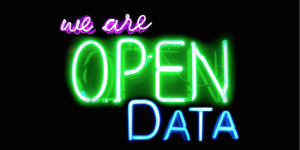[Note: this post is a slightly modified version of an earlier post. Although written with light (perhaps weak) humor, this post was created to bring attention to the Benefits of Open Data for innovation, value creation, and digital transformation on Open Data Day.]
Data Innovation is a powerful strategic goal for data-intensive organizations, especially to be celebrated through Data Innovation Day events, whenever they may occur. Here are the top 10 conversations that you do not want to have on that day. Let the countdown begin….
10. CDO (Chief Data Officer) speaking to Data Innovation Day event manager who is trying to re-schedule the event for Father’s Day: “Don’t do that! It’s pronounced ‘Day-tuh’, not ‘Dadda’.”
9. CDO speaking at the company’s Data Innovation Day event regarding an acronym that was used to abbreviate his job title in the event program guide: “I am the company’s Big Data ‘As A Service’ guru, not the company’s Bigdata ‘As Software Service’ guru.” (Hint: that’s BigData-aaS, not Big-aSS)
8. Data Scientist speaking to Data Innovation Day session chairperson: “Why are all of these cowboys on stage with me? I said I was planning to give a LASSO demonstration.”
7. Any person speaking to you: “Our organization has always done big data.”
6. You speaking to any person: “Seriously? … The title of our Data Innovation Day Event is ‘Big Data is just Small Data, Only Bigger’.”
5. New cybersecurity administrator (fresh from college) sends this e-mail to company’s Data Scientists at 4:59pm on Friday: “The security holes in our data-sharing platform are now fixed. It will now automatically block all ports from accepting incoming data access requests between 5:00pm today and 9:00am Monday. Gotta go now. Have a nice weekend. From your new BFF.”
4. Data Scientist speaking to new Human Resources Department Analytics Specialist regarding the truckload of tree seedlings that she received as her end-of-year company bonus: “I said in my employment application that I like Decision Trees, not Deciduous Trees.”
3. Organizer for the huge Las Vegas Data Innovation Day Symposium speaking to the conference keynote speaker: “Oops, sorry. I blew your $100,000 speaker’s honorarium at the poker tables in the Grand Casino.”
2. Over-zealous cleaning crew speaking to the Data Center Manager as she is arriving for work in the morning after Data Innovation Day event that was held in the company’s shiny new Exascale Data Center: “We did a very thorough job cleaning your data center. And we won’t even charge you for the extra hours that we spent wiping the disk drives clean and deleting all the dirty data that you kept talking about yesterday.”
1. Announcement to University staff regarding the Data Innovation Day event: “Dan Ariely’s keynote talk ‘Big Data is Like Teenage Sex‘ is being moved from basement room B002 in the Physics Department to the Campus Football Stadium due to overwhelming student interest.”

Follow Kirk Borne on Twitter @KirkDBorne


